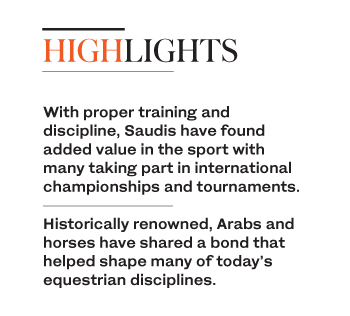JEDDAH: Tent-pegging, an ancient cavalry equestrian sport, is making a return in the Kingdom with the establishment of tent-pegging teams and supporting competitions across the peninsula.
Many believe the sport originated in Central Asia and the Middle East, with top teams such as Egypt, Oman, Iraq, Jordan and S udan competing in international championships, and Saudi Arabia’s recent participation drawing close attention.
udan competing in international championships, and Saudi Arabia’s recent participation drawing close attention.
For centuries, Arabs of the Arabian Peninsula and beyond were known for their equestrian skills, which were passed down through generations and recognized on a global scale. Historically renowned, Arabs and horses have shared a bond that helped shape many of today’s equestrian disciplines.
A mounted horseman and a team of four horsemen ride at a gallop and use swords and lances to pierce, pick up and carry away small targets inserted into or placed on the ground.
Saudi enthusiasts
For the past five years, Saudi equestrian enthusiasts have looked to tent-pegging as a rising sport in the region. With proper training and discipline, Saudis — both those with professional equestrian training and those without — have found added value in the sport with many taking part in international championships and tournaments.
Capt. Khalid Al-Suwaiket, founder of the Nomas tent-pegging team and an international judge, became interested in the sport in 2013 and became one of the first Saudis to go through formal intensive training in South Africa, a leader in the sport.
Since the introduction of tent-pegging recently, more people were turning to the sport than anticipated, he said.
“Tent-pegging is a sporting discipline that is one of the oldest in the region. Although show-jumping and polo are more common, it is making its way into the field slowly and professionally,” said Al-Suwaiket.
 “There are about 15 teams across the Kingdom, and the numbers are rising. In 2015, tent-pegging teams turned from enthusiasts to professionals by participating in a championship in Oman. Various competitions took place in Al-Ula, Bgaig, Al-Qassim and other areas in Saudi Arabia, and points were gathered on equestrians to find the most qualified to participate in international competitions.”
“There are about 15 teams across the Kingdom, and the numbers are rising. In 2015, tent-pegging teams turned from enthusiasts to professionals by participating in a championship in Oman. Various competitions took place in Al-Ula, Bgaig, Al-Qassim and other areas in Saudi Arabia, and points were gathered on equestrians to find the most qualified to participate in international competitions.”
Lances, swords and revolvers are used in tent-pegging. Each weapon has its own characteristics regulated by the international equestrian tent-pegging association, an international body that oversees competitions and all regulations related to the sport.
The equipment used are standardized pegs with specific thickness, color, size and even angle.
“With proper training, many of our riders were able to compete and find themselves in the top five, at least in some competitions. In my equestrian club, Al-Jawhara Stables, we train everyone and anyone willing to take up the sport. There is no age limit in tent-pegging, no weight limit and not even gender segregation,” said Al-Suwaiket.
Set of rules
“Unlike other equestrian disciplines, the rider takes command of the horse. Each host country provides the horses, unlike other disciplines, and the efficiency of each segment in the tournaments depends on the rider’s performance. Any points deducted or added are due to the performance.”
The sport depends on a specific set of rules that must be considered; the speed of a horse needs to be in a specific timeframe, a precise 60-degree angle of the peg, ring height, the length of a lance and sword as well as smooth finishing.
Each event consists of eight competitions, with a minimum of two runs.
Riders must perform each event as meticulously as possible to gather points. Overall, the four riders’ individual points in all competitions are added together to determine the winning team. Points are deducted if riders do not comply with the speed, the mount, the piercing of the target or other sets of regulations.
A number of young male and female equestrian enthusiasts are participating in various equestrian disciplines offered at the many stables around the Kingdom.


























